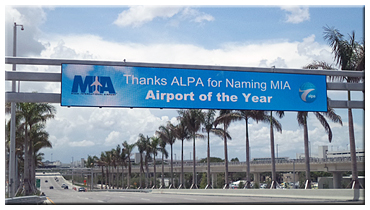| ALPA Recognizes Importance of Working with Airports
 August
6, 2014 - During the Wednesday afternoon session of ALPA’s
Air Safety Forum, the Association honored First Officer Ali
Frohlich (DAL) with the 2013–2014 Outstanding ALPA Airport
Safety Liaison (ASL) award for his work advancing aviation
safety at Northwest Florida Beaches International Airport (ECP). August
6, 2014 - During the Wednesday afternoon session of ALPA’s
Air Safety Forum, the Association honored First Officer Ali
Frohlich (DAL) with the 2013–2014 Outstanding ALPA Airport
Safety Liaison (ASL) award for his work advancing aviation
safety at Northwest Florida Beaches International Airport (ECP).
During his presentation of
the award, ALPA First Vice President and Air Safety
Coordinator Sean Cassidy noted that Frohlich provided pilot
input during the construction of the nation’s first major
airport (i.e., ECP) since 2001 and helped institute numerous
safety enhancements into the airport master plan, including
the lengthening of a runway. Thanks to Frohlich, ALPA has
fostered a strong partnership with ECP.
“ALPA’s Air Safety Liaison
program puts line pilots in direct contact with the
management and staff of airports all over the United States
and Canada,” said Cassidy. ASLs work collaboratively with
airports on a wide variety of projects dealing with subjects
from airport construction to air traffic control.
ALPA presented its 2013–2014
Airport of the Year award to Miami International Airport
(MIA) for its commitment to engaging with airline pilots who
operate there to ensure the highest safety standards for
passengers, crews, and cargo. Accepting the award for the
airport was Jim Murphy, airport supervisor, Airside
Operations.
ALPA selected MIA in part
for its track record of maintaining effective channels of
communication with ALPA’s MIA ASL, First Officer Carlos Suhr
(DAL). Murphy and the rest of his team have consistently
demonstrated that they understand the importance of having a
line pilot’s perspective when it comes to safety concerns.
For example, Suhr advised
Murphy of two potentially hazardous situations concerning
the markings of “hotspots” that were identified through the
Federal Aviation Administration’s Aviation Safety Action
Program (ASAP) reporting system. After completing a thorough
investigation, Murphy made the necessary changes to the
airport’s markings and signage so that these kinds of events
would not occur again.
“ALPA pilots operate
hundreds of flights at Miami every day,” said Cassidy. “Our
members tell us that the airport management is always
receptive to our concerns and works together with us to
ensure the safest possible operation,” he added. |